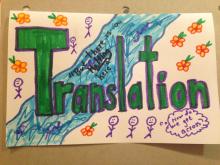February 16, 2016 - 01:18
One idea that struck me from Kuppers’ book was the concept of translation in terms of telling stories and the question of how much one can really communicate through telling a story. She talks of “connecting the intensity with a larger audience,” which touches upon an issue that all writers face when thinking about the purpose of their writing and how they could bring across their message in the most effective way. It leads me to wonder how much Kuppers is actually “withholding,” not in the sense of deliberately keeping information from her readers for some ulterior motive, but in the sense that an author cannot communicate every detail of an experience accurately, so there are many aspects of the real life experience left out of the written story. The reader’s experience of a reading a story is much different than the author’s experience of the same story based on the way the author presents their words, in addition to the reader’s own preconceived notions and biases. Every reader will read every story differently. Usually, when I think of the word translation, I think of bringing words from one language across to a different language because the word “translation” literally comes from Latin words meaning “to carry across.” It is interesting to think of translating a story from an experience into writing because it is almost as if the physical, real-life experience is metaphorically a different language from the written story. In fact, in a way, an author is bringing across their memory of an experience into a new language, a written language. I think that this idea of translation when it comes to writing stories and trying to communicate feelings means that everyone’s experience of one single story can be different in so many ways.


Comments
Reply
Submitted by Florian on February 16, 2016 - 11:20 Permalink
I enjoy your discussion of the literal meaning of "translation", and the way you so effectively illustrated it, using the word itself as a bridge- an accomodation- to carry people across an obstacle they would not have otherwise been able to overcome. It's a very effective visual.
"Every reader will read every
Submitted by fsalcido on February 16, 2016 - 11:45 Permalink
"Every reader will read every story differently." I agree! Mary, your postcard has really resonated with me. I always have trouble sharing something personal because of my apprehension of it being misinterpreted. However, I sometimes think it is my fault since I really do filter what I decide to share for the sake of not oversharing and fear of miscommunication. I don't think Kuppers has this problem but I also agree that there are things we can't communictae effectively - but this definitely does not mean it is not there or that it is not worthy.
Dangers of translation?
Submitted by smalina on February 16, 2016 - 11:48 Permalink
I'm also really intrigued by this idea of translation--and makes me wonder: is it dangerous for us to speak to these stories, having only heard the "translated" version as told by Kuppers? And if we acknowledge that all shared stories have gone through some process of translation, how can we engage in a respectful way with any at all? Are we really hearing truths, or just some sort of representation or simulation of the "reality?" Makes me think about one of the readings for class today--on recognizing that while reality does exist underneath all of our daily interactions, it may be a helpful form of meditative practice to recognize that most of the information we are taking in is just a simulation, of sorts, of the world. This may help us look at these translated stories with a more critical eye, one that allows us to recognize that they have gone through the translation already.